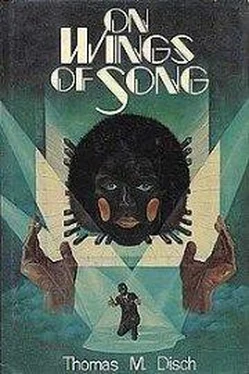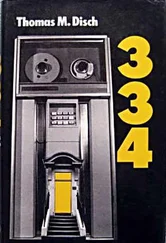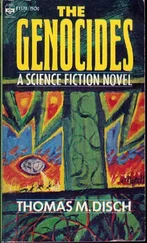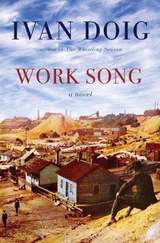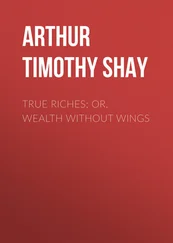“Me?” Daniel said.
“At the moment, of course, Ben, I can’t answer that question. But if you would like to come in, and let us have a look at you…”
“Certainly.”
“Our mutual friend has assured me that you’re a perfect diamond in the rough. His very words. What we must consider is, how rough, and what sort of polishing will be required.”
“When would you want me to come by?”
“Is now too soon?”
“Um, actually, a bit later would be better.”
“I’ll be here till five. You know where the Teatro is?”
“Of course.”
“Just tell the man in the box office you want to see Mr. Ormund. He’ll show you the way. Bye-bye.”
“Bye-bye,” said Daniel.
“And,” he added, when he could hear the dial-tone, “amen, amen, amen.”
The Metastasio!
Realistically, he just wasn’t that good. Unless it was a place in the chorus. That must be it. But even so.
The Metastasio!
Mr. Ormund had said something about his looks , or looking at him. That was probably what was behind it. What he must do then, surely, was to look his best — and not his grotty best but his posh best, since this was, after all (and praise God), a job interview! That meant getting hold, somehow, of Claude Durkin, in one of whose closets Daniel kept the last suit remaining to him from his prehoneymoon shopping spree in Des Moines. It had survived only because he’d been wearing it the night everything else was stolen from his room at the Sheldonian. The jacket was tight across the shoulders now, thanks to Adonis, Inc., but the basic cut was conservative and didn’t give away its antiquity. In any case, it was all he had so it would have to do.
Daniel took another quarter out of the coin box, and phoned Claude Durkin. He got an answering device, which could mean either that Claude was out or that he wasn’t feeling sociable. Claude periodically came down with crushing depressions that kept him incommunicado for weeks at a time. Daniel explained to the answering device the urgency of his situation, and then, when Ned got back from lunch, trotted off to Wall Street, where Claude lived, wearing the jeans and turtleneck from his locker. If worst came to worst, he’d have to see Ormund in those.
The whole Wall Street area was a high security zone, but Daniel was registered as a visitor at the William Street checkpoint and was able to breeze right through. Claude, however, still wasn’t home when Daniel arrived at his building, or he couldn’t be bothered, so Daniel plunked down on the concrete ledge of an ornamental pool and waited. Daniel was good at waiting. In fact, he made his living as a waiter, waiting in ticket lines. He would go to a box office early on the morning that seats became available (sometimes, a day or two in advance) in order to buy tickets for people who weren’t free to stand in the line themselves, or just didn’t want to. Working at the gym provided him with a roof over his head; waiting paid for his groceries, at least from September through May, when there was something worth waiting in line for. In summer, he had to find other means of survival.
Claude Durkin was one of Daniel’s best customers. Also, gingerly, a friend. They’d met in Daniel’s palmier days, when he was taking a course at the Manhattan League of Amateurs. The M.L.A. was less a music school than an introduction service. You went there to meet other musicians at your own level of taste, zeal, and incompetence. Claude had been going there, off and on, for years and taken most of the courses in the catalogue. He was forty when they met, a bachelor, and a fairy, though of uneven capability. In his youth he’d flown fairly regularly, though always with great effort. Now he got aloft at most two or three times a year, with even greater effort. Daniel always wondered, though he was too polite to ask, why Claude didn’t just take off permanently, the way (it would seem) that Boa had, the way he meant to if he ever reached escape velocity, which (it would also seem) he was never going to. Alas.
He waited, and he waited, fantasizing all the while about the Metastasio, though he knew he shouldn’t since he might not get the job. Gradually, the weather seemed to warm up. The fountain choked and gurgled at the center of the pool. A lost poodle ran around in circles, yapping, and finally was found. A policeman asked to see his I.D. — and then recognized him. It was a policeman from the gym.
At last, the third time he asked the doorman to buzz, he got in. Claude had been home all along, it turned out — asleep. He was in one of his bluer moods, which he nevertheless tried to conceal out of deference to Daniel’s euphoria. Daniel told the brief tale of Ormund’s call, and Claude made an effort to seem impressed, though he was still half-asleep.
Daniel refused Claude’s first offer of a bath in his tub, and accepted the second. While Daniel soaked, and then while he scrubbed, Claude, in full-lotus position on the carpet, described the dream he’d just awakened from. It involved flying through, around, and over various churches in Rome, imaginary churches that Claude was able to describe in wearisome detail. Though he’d long since ceased to be a practising Catholic, or even a practising architect, churches were Claude’s thing. He knew everything there was to be known about the ecclesiastical architecture of Renaissance Italy. He’d even taught a course in it at N.Y.U. until his father had died and left him a large hunk of secular architecture, the rents from which had made it possible to lead his present liberated, disgruntled life. He was always at loose ends, taking up interests and setting them aside like bibelots in an antique shop. His most abiding preoccupation was the decoration of his apartment, which changed every few months in accordance with his most recent acquisitions. The walls of all his rooms were one endless sideboard displaying bits and pieces of poor old demolished Europe: Ionic capitals, little ivory madonnas, big walnut madonnas, details of stucco-work, samples of moldings, fragments of statues in every degree of dismemberment, pewter dishes, silver dishes, swords, gilded letters from the fronts of shops, all of it stacked up higgeldy-piggeldy on the custom-made shelves. Each piece of junk, each precious jewel had its own story concerning the shop where he’d bought it or the ruin he’d dug it out of. To do Claude credit, most of his acquisitions he’d scouted out himself. Whenever he flew, his destination was some bomb site in France or Italy where he would flit about the rubble like some disembodied magpie, giddy with plundering. Then, when he’d flown back to his nest on Wall Street, he’d send off instructions to various agents who specialized in scavenging for American collectors. All in all, it seemed to Daniel a great waste of flight-time, not to mention money. He’d even said as much to Claude one Christmas in the tactful (he hoped) form of a limerick written in the flyleaf of the book he’d given him as a present (the book was a 19th century guidebook to Italy that he’d found in a box of garbage). It stood now, the limerick, carved on a granite tombstone, below Claude’s name and the date of his birth, an accepted component of the mise-en-scene :
There once was a fairy named Claude
Who loved to go visiting God;
If God wasn’t home
He would seek Him in Rome
On Maria Minerva’s facade.
Having told his dream and worried a portent or two out of it, Claude approved of Daniel’s turnout, with the exception of his tie, which he insisted on his replacing with one of his own in last year’s latest design of giant waterdrops running down clear green glass. Then, with a kiss on the cheek and a pat on the rump, he saw Daniel to the elevator and wished him the best of luck.
Читать дальше
